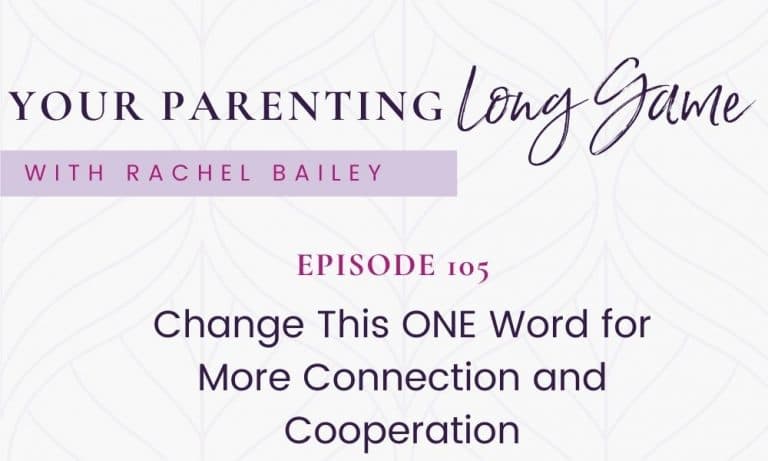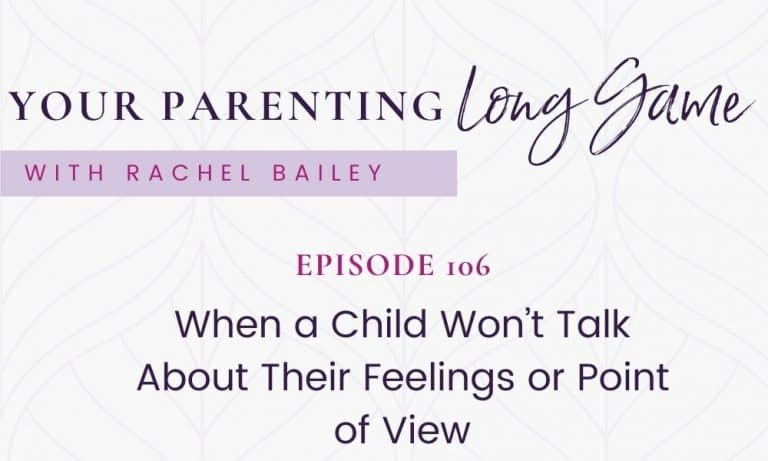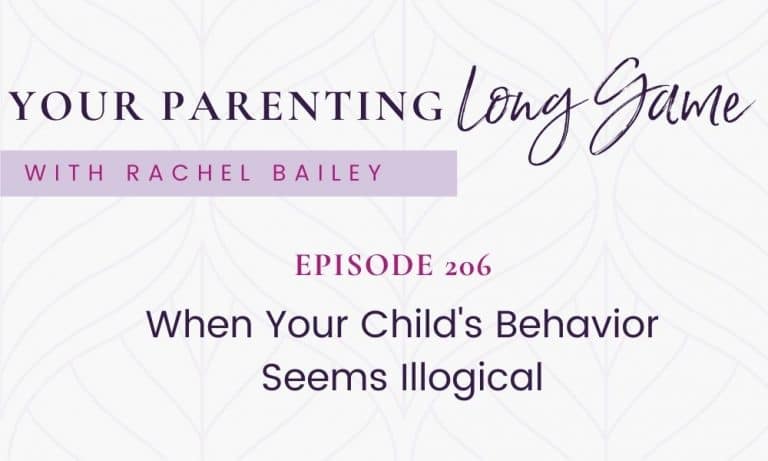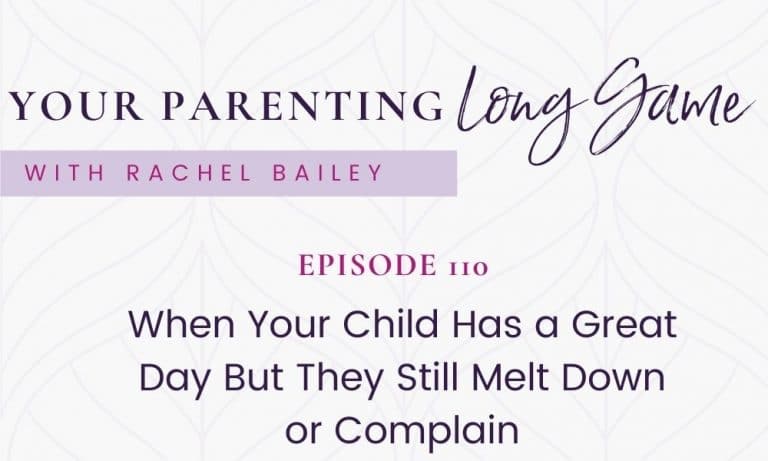Episode 205 Transcript

TRANSCRIPT: Your Parenting Long Game Episode 205 – How to Make It Less Exhausting To Deal With Drama In Your Home
Hi, it’s Rachel and welcome to episode 205 of Your Parenting Long Game, where I’m going to talk about how to make it less exhausting to deal with the drama in your home.
As you may have heard, I’ve been focusing recently on supporting parents and caregivers of children with big emotions, helping you understand your big-emotion children, especially as their behavior — let’s be honest — can often be illogical and confusing.
As you’re working on seeing your children differently, I want to give you a tip that may help YOU reduce your Yuck.
And in fact, I have a new program that I’ve created for parents of children with big emotions. It’s called The Parenting Long Game Method for Raising Children with Big Emotions. And in it, I teach a step-by-step process for bringing more peace and flexibility to your entire family. In that program, which really does bring flexibility to the entire family, I start by focusing on parents because we, as parents, truly are a big part of the solution for bringing more peace to our homes. But in order to be part of that solution, we can’t be in constant Yuck.
Now, by the way, if you want to know more about The Parenting Long Game Method for Raising Children with Big Emotions, I’d start with my new free video series about raising kids with big emotions. As part of that video series, you’ll see that you can sign up for your Long Game Audit, where I talk to you about your situation and how my roadmap can get you from where you are now to where you want to be with your family. You can find all of that on my website, www.Rachel-Bailey.com/longgame
Okay, so let’s talk about being less exhausted. I mean, who doesn’t want to be less exhausted?
Well, in order to get to this point, you need to think about why you’re exhausted to begin with. Of course, the answer is simple. You have a lot of demands in your life, and they’re probably wearing you down. But I will tell you that your kids’ behaviors and emotions do not have to add to that exhaustion.
Let me tell you why. Here’s probably what normally happens: You are tired. There’s a lot going on for you, and then your kids start complaining. Maybe your son is really mad and won’t let go of the fact that you spend more time with his sister than you do with him, and he just doesn’t think it’s fair…and why do you always do that?
And the problem that we all have, if not checked, is that we see that behavior as a problem, a bad thing, another thing that we have to deal with, and that exhausts us. And you know what happens when we see a problem or a bad thing? Our fight or flight response kicks in.
Our fight or flight response is a physiological reaction that takes place in our body, and it takes a lot of energy to be in fight or flight. It drains us more… when we’re already tired.
So you’re seeing that behavior is a bad thing. You’re probably thinking, “Oh, why does he keep complaining about how much time I spent with his sister? Why can’t he just be happy that I took him to the mall the other day and spent hours of time with him?”
And usually at that point, one of two things happens. Chances are — because you’re in fight or flight, because you saw this as a threat — your brain is actually telling you to spend more energy convincing your child how wrong he is, how you really don’t spend more time with his sister. Or maybe you’re trying to justify why you do spend more time with his sister.
That probably doesn’t go well in either case.
Or maybe, just maybe, you don’t give into that urge of fight or flight. You don’t try to convince him of anything. If you’re not giving in, probably what you’re doing instead is using willpower. You know you should stay calm, but you’re not really calm inside. You’re using every ounce of energy to make sure you don’t blurt out what’s in your mind. And that — using willpower — is exhausting also. And here’s a little spoiler alert: Your willpower will rarely be stronger than your fight or flight response. Willpower is limited and our fight or flight response is strong. Even if you don’t lose it on your child now, you probably will another time. You’re just storing it up, and it’s going to come out later.
So what is the alternative then, if our fight or flight sponsor is so exhausting? If willpower is so exhausting, what do we do instead?
Here’s the alternative. It sounds really simple. I know it’s not easy, but it kind of is simple.
The solution is to stop seeing your child’s behavior as a threat, to see it instead as something that happens, something you can handle, something you even know how to handle, so that it is no longer a threat.
Now I’m not saying you’re going to be excited or happy about it. But when you know it’s coming and you know what to do when it happens, your brain stops seeing it as a threat, your fight or flight response doesn’t kick in, and you don’t make the situation worse or have to use willpower to stay calm.
I know what you’re thinking. You’re probably thinking, “But wait, aren’t their dramatic responses, objectively a bad thing. How could we possibly stop seeing it as a threat?”
Here’s what I will tell you: I have worked with hundreds of families who used to believe their children’s emotions and reactions were a bad thing. And now they do not.
And these same families, almost all the time, tell me that they feel they’ve been liberated.
I’m actually also going to give you some objective reasons that big emotions and big reactions are not actually a true threat. They’re not something you have to avoid or something you have to try to stop as quickly as possible. These behaviors are not a threat, and they’re not dangerous.
They’re simply a sign that, in that moment, your child’s Yuck is bigger than their coping skills. They’re disappointed that they didn’t get more time with you, and instead of knowing to say that, they’re complaining that it’s not fair. They’re uncomfortable, and they’re doing what many other human beings do when their Yuck is really big.
They aren’t great at being mature when their Yuck is really big. They’re simply letting out their Yuck in a less-than-mature way. They’re being a child acting like a child (and I would argue acting like some adults as well).
Now, another reason that their reactions and their behaviors are not a threat, they’re not dangerous, is because these behaviors do end. Last week, I talked about letting a child do what I call traveling the Yuck Curve. The truth is that once a child travels the Yuck Curve, the negative behavior, moods, and attitudes stop. And they travel that curve much faster when we stop trying to stop the negative behavior, moods, and attitudes, when we don’t get sucked in. We don’t get sucked in because we know it’s going to happen. We expect their response. (We’re not looking forward to it; we’re just expecting it.) When we know that it’s going to happen, and we know how to handle it, it won’t drain us.
In fact, one of the things I sometimes do, when one of my kids is on the Yuck Curve, is imagine that image of the rainbow-shaped curve in my mind. And I remember that the arc of the curve does eventually end.
What’s interesting is that unless there’s a true life-threatening situation, like we’re being chased by a bear or we’re being chased by someone down a dark alleyway, unless there’s a true life-threatening situation, our brain doesn’t actually know if something is a threat or not. We tell it whether something is a threat or not, and our brain listens to us to determine whether to go into fight or flight.
I want to give you an example of what it might sound like inside the mind of a parent who is triggered in fight or flight and the same parent who is not triggered. And you’ll see that the difference is simply the way this parent perceives the situation, what this dad tells himself is happening.
So this is a story about a dad named Travis, and he has a son named Elliot, who rarely, if ever, does something the first time he’s asked.
If someone asks him to brush his teeth, son Elliot, immediately says no. If anyone tells him that he has to put his clothes away, it’s, “I don’t feel like it.”
Now, here’s what his dad, Travis, is often telling himself when Elliot says no. And remember, this is what Travis’ brain is listening to, in order to determine if there’s a threat or not. Dad Travis, is thinking, “Oh, I can’t believe Elliot is so disrespectful! He’s acting so spoiled! Why does he always have to say no? I never thought I’d raise a son like this. I certainly didn’t act like this as a child. I have to figure out what I can do to get him to listen without refusing first.”
And while dad Travis, isn’t necessarily wrong about these things, what he’s telling himself about them isn’t serving him, his son, or the situation, because it’s putting him into fight or flight.
If he’s telling himself this story, Travis is either going to start to lecture Elliot, or maybe he’ll take away everything he cares about in order to “motivate” Elliot. The situation is not going to go well. He’s going to be in fight or flight. Chances are Elliot’s going to go into Yuck, and it won’t go well. It’s going to be even more exhausting than it has to be.
But here’s what dad Travis could be thinking that is also accurate. Travis could be saying to himself — which his brain will hear to determine whether there’s a threat or not — Travis could be saying, “Oh yeah, Elliot says no every time I ask him to do something because requests make him feel out of control, even when he knew they were coming. And he says no, or he complains, because he doesn’t have great coping skills, because he is a kid. This is something that we can work on.”
And Travis can even decide how to handle those situations so his brain is even less likely to see it as a threat and go into fight or flight.
Travis can say to himself, “Next time, I’m going to expect that Elliot’s going to say no. Then it won’t bother me so much. And I can handle it with confidence instead of anger. When it happens, I’m going to remind myself, I knew this was coming, no biggie. And then I’ll let him know that I can either help him with what I’m asking him to do, or not. I can also offer Elliot suggestions that make the task a little bit more engaging for him, because I know that helps him actually do what he’s supposed to do. And if nothing else helps, I’ll just stay firm and let Elliot travel the Curve.”
Here’s the thing: When Travis stops seeing his son Elliot’s behavior as a threat, he’s not triggered. And he is not as exhausted by Elliot’s behavior. He is not condoning his behavior. He’s just thinking about it and handling it in a way that takes less energy, because he’s not dealing with this fight or flight response kicked into high gear.
So here’s the action I recommend you take now. And yes, of course, this starts with you. Not just, “How can I make my child change?” (Your child won’t get out of Yuck until you are out of it first.) So to help yourself, I suggest that you note a behavior that usually triggers you, and tell yourself that you will expect it going forward. That alone can reduce your fight or flight response.
Again, accepting it is not condoning it. It doesn’t mean you can’t work on it outside of the moment. It’s just in the moment you want to expect it, so your brain isn’t seeing it as a threat.
Then what you can do with this situation is to focus on what is in your control. Create what I call a “when then statement”: When my child _____, then I will ______.
Now, again, you’re not letting your child get away with anything because you’re focusing on what you will do. You’re just approaching it with a part of your brain that solves problems more effectively. And also remind yourself that when all else fails, you can always let your child travel the Yuck Curve — because when they do, that’s when their behaviors, moods, and attitudes change.
You can handle whatever they’re doing. And when you believe it, your child will sense it too, and things will go much better.
When you stop seeing their behaviors, moods, and attitudes as a threat, your fight or flight response won’t kick in. And you won’t be exhausted by that or by having to use willpower. It’s just a lot less exhausting dealing with their drama.
And when you stop seeing their behavior, moods and attitudes as a threat, you can access the effective part of your brain. When you stop seeing them as a threat, you won’t make your child’s Yuck and resistance worse.
Now, of course, there are always unique challenges in raising your children with big emotions, especially as you’re using your parenting long game. It may take a while before you stop seeing their behavior as a threat, but I’m happy to help you through this process.
As I mentioned earlier, I’d love you to watch my free video series that helps you understand how I approach this and bring more peace to homes. You can find that free video series at rachel-bailey.com/longgame.
And I would also ask if you enjoy this podcast to subscribe, rate, and review it. To those of you who have already rated, I really appreciate it. I read all of your comments, including this one. This is one that I noticed recently. A listener said, “This podcast is quick to the point, down to earth, and realistic. I love listening to it as it helps me to be a better parent and focus on the right things.” So I want to say thank you so much to “incorrect points” — that was the name of the listener who wrote that in. I really appreciate it.
I will be back again soon with all of you with more tips to improve your parenting long game, especially as you are raising children with big feelings and emotions. I’ll see you soon.
Follow Rachel on Instagram: https://instagram.com/rachelbaileyparenting
Join Rachel’s Facebook group: https://www.facebook.com/groups/RachelBailey/
Sign up for Rachel’s free weekly tips by email: https://rachel-bailey.com/weekly-tips/






